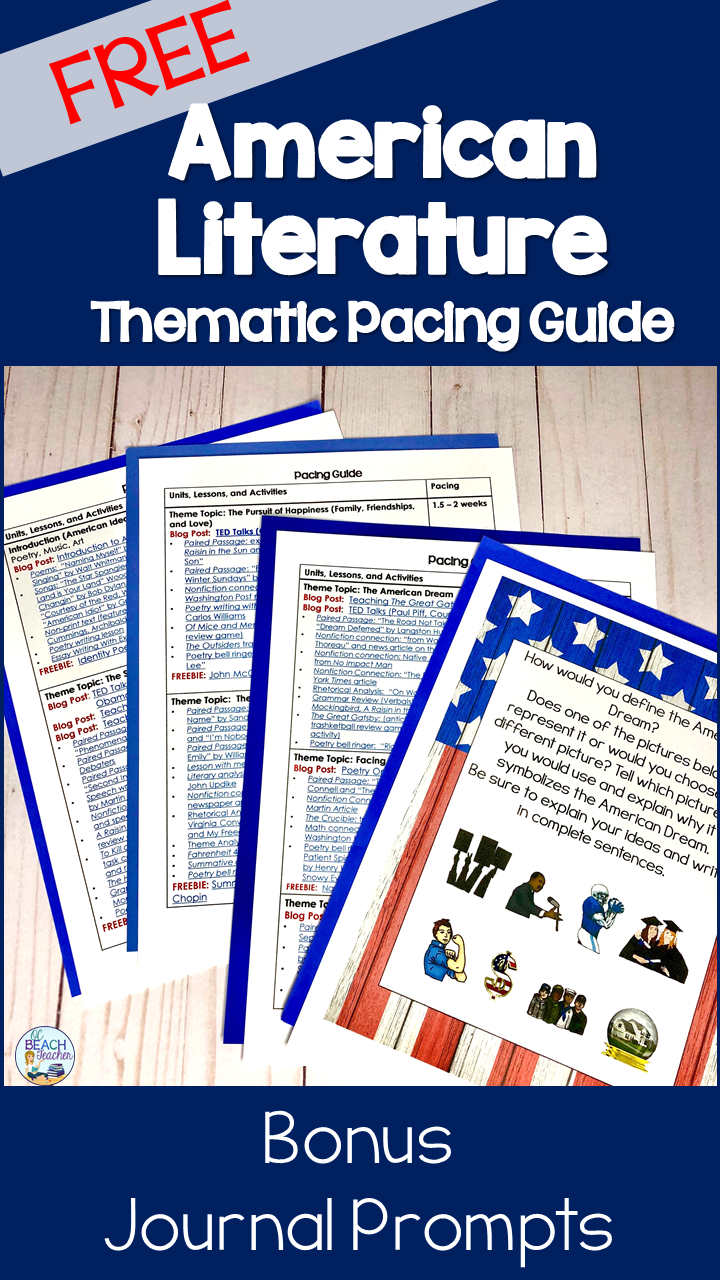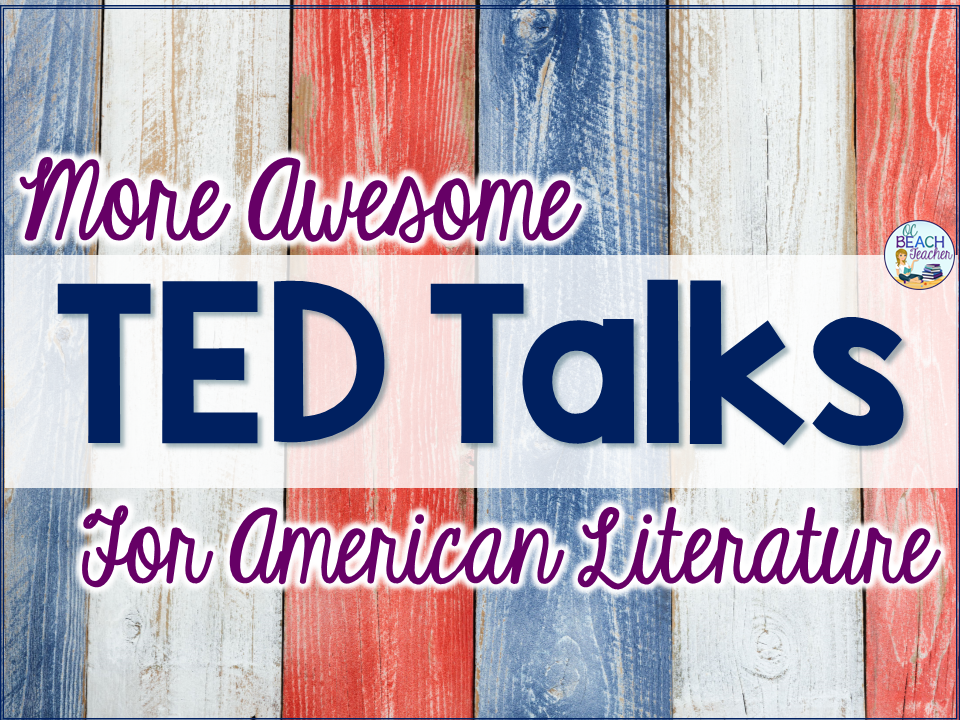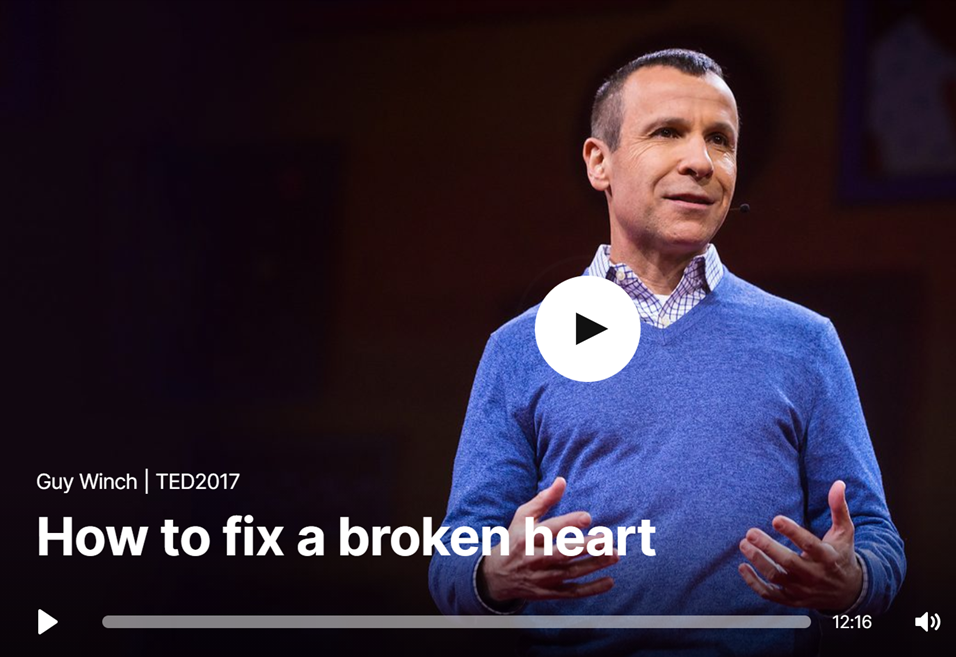Students need teachers to make learning relevant and engaging, and one excellent tool for this is the use of TED Talks. I’ve been teaching American Literature for over 10 years and have found numerous TED Talks that connect to the texts my students read. In fact, I wrote about eight of them in an earlier blog post and have recently found more to add to my previous list.
For each talk below, I’ve included recommended literature connections, but I’m certain there are innumerable texts that may apply to each talk. Also, keep in mind that you can print transcripts of the talks to prepare for technology glitches or if you want students to take a closer look at the texts of these speeches. TEDTalks also allow you to use subtitles so you can meet the needs of all of your students.
TED Talks for American Literature
1. America’s Native Prisoners of War by Aaron Huey
Date Given: 2010
Length: 15:13
Summary: In this sobering, yet informative talk, Huey reveals the shocking treatment of Native Americans (specifically the Lakota) in our country. He shares a historical timeline of numerous injustices against the tribe and the meaning of the Lakota word, “Wasichu.” Perhaps with a better understanding of the events Huey recalls, our students will not only have more empathy for indigenous peoples but may choose to fight for solutions that help Native Americans with the many problems they face in the United States today.
Relevant Connections: “I Will Fight No More Forever” by Chief Joseph, Native American Myths, Killers of the Flower Moon by David Grann, ThereThere by Tommy Orange
Get
2. How to Talk to Veterans About War by Wes Moore
Date Given: 2014
Length: 14:16
Summary: Moore’s mom sent her son to military school when he continually got into trouble as a young boy, and in this talk, Moore shares how that decision led to his time in the army and eventual deployment to Afghanistan. After returning from war, he realized he had a much truer understanding of the saying, “thank you for your service.” Now he encourages people to ask veterans to share their stories and experiences as a way to honor them.
Relevant Connections: The Other Wes Moore by Wes Moore, The Things They Carried by Tim O’Brien, The Red Badge of Courage by Stephen Crane,
3. The Sibling Bond by Jeffrey Kluger
Date Given: 2011
Length: 20:48
Summary: Many works of literature include sibling relationships, and this talk explains the important role siblings play in people’s (and characters) lives. Kluger shares examples of the impact siblings have had on his own life, the lives of famous historical figures, and those of people he interviewed for his book, The Sibling Effect. He also provides key findings from the scientific research on siblings. This is certainly a talk that will be meaningful for your students!
Relevant Connections: Brighton Beach Memoirs by Neil Simon, To Kill a Mockingbird by Harper Lee, Catcher in the Rye by J.D. Salinger, Little Women by Louisa May Alcott, “Everyday Use” by Alice Walker
4. On Being a Woman and a Diplomat by Madeleine Albright
Date Given: 2010
Length: 12:44
Summary: Empower and educate your girls (and boys) with this conversational talk between former Secretary of State Madeleine Albright and Pat Mitchell. The talk begins with Albright’s explanation of her pin collection, including the pin “Breaking the Glass Ceiling,” that she wears during the talk. She also shares information from her diplomatic experience and explains that women’s issues are world issues and should be central to foreign policy. Not only does her talk provide interesting information, but she acts as a role model to our female students.
Relevant Connections: “Ain’t I a Woman?” by Sojourner Truth, “On Women’s Rights” by Elizabeth Cady Stanton, “Phenomenal Woman” by Maya Angelou, The Awakening by Kate Chopin, and The Poisonwood Bible by Barbara Kingsolver
5. Immigrant Voices Make Democracy Stronger
Date Given: 2016
Length: 12:33
Summary: In this talk, Sayu Bhojwani shares her personal experience of immigrating to the United States from India through Belize. She discusses the importance of getting immigrants to vote and make their voices heard in America. Ultimately, she advocates for three things — immigrants’ votes, voices and vantage points — that she thinks can help make our democracy stronger. By sharing her personal experience and struggles, she also helps connect to our immigrant students.
Relevant Connections: The Joy Luck Club by Amy Tan, Behold the Dreamers by Imbolo Mbue, I Am Not Your Perfect Mexican Daughter by Erika Sanchez, “The New Colossus” by Emma Lazarus, “Let America Be America Again” by Langston Hughes, The House on Mango Street by Sandra Cisneros, and Refugee by Alan Grantz
6. Why Teens Confess to Crimes They Didn’t Commit by Lindsay Malloy
Date Given: 2016
Length: 14:35
Summary: This fascinating talk brings to light an issue that may be particularly relevant and interesting to teens. Lindsay Malloy, a forensic development psychologist, explains why some people would confess to crimes they were later exonerated for with D.N.A. evidence. As part of the discussion, she highlights the case of Brendan Dassey, a 16-year-old student with an IQ of 70. She advocates for change in the legal system for young suspects and educating law enforcement.
 Relevant Connections: The Crucible by Arthur Miller, Monster by Walter Dean Myers, The 57 Bus by Dashka Slater, “Half Hanged Mary” by Margaret Atwood (Canadian but I include North American authors in my class sometimes), “Civil Disobedience” by Henry David Thoreau
Relevant Connections: The Crucible by Arthur Miller, Monster by Walter Dean Myers, The 57 Bus by Dashka Slater, “Half Hanged Mary” by Margaret Atwood (Canadian but I include North American authors in my class sometimes), “Civil Disobedience” by Henry David Thoreau
7. How to Fix a Broken Heart by Guy Winch
Length: 12:16
Summary: Romantic relationsips often consume the hearts and minds of teens. And unfortunately, sometimes these relationships end in heartbreak. For this reason, high school students will find this TED talk engaging and relevant. Pyschologist Guy Winch uses anecdotes from his counseling practice to explain the science of the brain and human emotions when experiening heartbreak. Best of all, he provides specific steps that people can take to move foward with their lives after a breakup.
Relevant Connections: The Great Gatsby by F.Scott Fitzgerald, “The Story of an Hour” and “Desiree’s Baby” by Kate Chopin, Snow Falling on Cedars by David Guterson, A Raisin in the Sun by Lorraine Hansberry, “A Rose for Emily” by William Faulkner
8. The Difference Between Healthy and Unhealthy Love by Katie Hood
Date Given: April 2019
Length:12:05
Summary: Unfortunately, many teens end up in abusive and unhealthy relationships, so this TED Talk provides important lessons for them. The speaker works for an organization called One Love that was started by the family of Yeardley Love, who was murdered in 2010 by her University of Virginia boyfriend. In the talk, Katie Hood reviews five signs of unhealthy relationships including intensity, isolation, extreme jealousy, belittling, and volatility. Be aware that this talk may trigger strong emotional reactions in some of your students. You may want to warn them before showing the talk.
Relevant Connections: In addition to the texts listed with the TED Talk above, other texts that could work with this include the following: “To My Dear and Loving Husband” by Anne Bradstreet (as a contrast), “My Papa’s Waltz” by Theodore Roethke, “Mad Girl’s Love Song” by Sylvia Plath, Of Mice and Men by John Steinbeck
And of course, please share your recommended talks in the comments below! Additionally, these handouts can help your students practice their listening and analysis skills as they watch.
If you’re new to American Literature or just looking for innovative ideas for teaching the class, you may also be interested in my free pacing guide.




